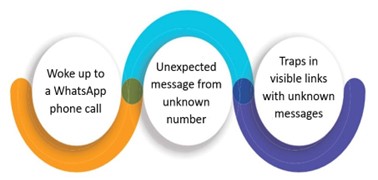Double trap what and why!
Digital day and nights have hundreds of links circulating on devices, apps or links. In many cases fake links are encountered. Many people become victims either by mistake or by immediate mistake. We have to face social, human and financial disasters. Protection can be missed without extra precautions.
 A message may have appeared on your device from an unknown number. Also given online link. If you in a forgetive moment click on that link, the incident starts there. Wake up in the morning and reach for the smartphone. Noticed a message from an unknown number – Passed the interview successfully. Or the money will be credited to your account. Please confirm... the matter starts then!
Online links with unknown messages are also visible. You just need to go to that link and ask for money. Maybe you think, when you gave the interview or if you gave it at all; Maybe you had an interview in the recent past. So immediate suspicion may not come to mind.
Finally, couldn't resist clicking on the link. The incident took a turn there. Because, from that link, malware or phishing link will easily enter your gadget. By clicking on it, the hacker cycle will take control of the trapped device. Fraud strategies will spread in a moment. The scamming group can put many people in danger before they know it.
Scams are not new by posting fake job ads or fake links claiming to win the lottery. The two mentioned methods are becoming obsolete now. Therefore, fraudsters are constantly inventing new traps. Within a short time of receiving the two mentioned messages, another message appeared on the mobile again. The message may have been spoofed by sending such messages. Another link has been sent to ensure that such messages do not come in the future, it will also contain a fraud trap.
Even if the first message is ignored, it is normal for the second message to be important. Because almost everyone is worried about when a hacker will take control of their device, smartphone or laptop online or when money will be stolen from the financial transaction account by sending a malicious link.
By the way, if there is another option to stop fake messages, then many people will want to be reassured. But there is also a problem. Because the link sent with the next message is basically a trap. If you click on that security-related link, the cyber gang can hack your smart device in the same way.
First, the trap page of fraud called fake interview, if somehow the trap is avoided, the cyber criminals are throwing a new net, so that the target is not missed in any way. Cybercriminals are not just messaging, but fraudsters also use WhatsApp or other social media apps to set up a 'double trap'.
A message may have appeared on your device from an unknown number. Also given online link. If you in a forgetive moment click on that link, the incident starts there. Wake up in the morning and reach for the smartphone. Noticed a message from an unknown number – Passed the interview successfully. Or the money will be credited to your account. Please confirm... the matter starts then!
Online links with unknown messages are also visible. You just need to go to that link and ask for money. Maybe you think, when you gave the interview or if you gave it at all; Maybe you had an interview in the recent past. So immediate suspicion may not come to mind.
Finally, couldn't resist clicking on the link. The incident took a turn there. Because, from that link, malware or phishing link will easily enter your gadget. By clicking on it, the hacker cycle will take control of the trapped device. Fraud strategies will spread in a moment. The scamming group can put many people in danger before they know it.
Scams are not new by posting fake job ads or fake links claiming to win the lottery. The two mentioned methods are becoming obsolete now. Therefore, fraudsters are constantly inventing new traps. Within a short time of receiving the two mentioned messages, another message appeared on the mobile again. The message may have been spoofed by sending such messages. Another link has been sent to ensure that such messages do not come in the future, it will also contain a fraud trap.
Even if the first message is ignored, it is normal for the second message to be important. Because almost everyone is worried about when a hacker will take control of their device, smartphone or laptop online or when money will be stolen from the financial transaction account by sending a malicious link.
By the way, if there is another option to stop fake messages, then many people will want to be reassured. But there is also a problem. Because the link sent with the next message is basically a trap. If you click on that security-related link, the cyber gang can hack your smart device in the same way.
First, the trap page of fraud called fake interview, if somehow the trap is avoided, the cyber criminals are throwing a new net, so that the target is not missed in any way. Cybercriminals are not just messaging, but fraudsters also use WhatsApp or other social media apps to set up a 'double trap'.
 As a result, cyber experts have advised to be very careful about where the suspicious message came from. According to the complaint sources, in most cases, such criminal gangs work in China or some African country to operate the primary trap of fraud.
How to be careful
As a result, cyber experts have advised to be very careful about where the suspicious message came from. According to the complaint sources, in most cases, such criminal gangs work in China or some African country to operate the primary trap of fraud.
How to be careful
The first thing to consider is that any message from an unknown number needs to be scrutinized, the source of the sender must be confirmed first. Banks, Police, Insurance, Telecom, Mobile Service Providers – Any unexpected message from any of the mentioned organizations should be checked before responding quickly. Because, under the guise of those identities, fraudsters send malicious links and trap common people.
So, to know how to protect yourself from the latest cyber-crime cycle, communicate directly with the contact number of the concerned organization, from where the links are sent, to get clear about the doubt. However, do not respond to any warning messages sent by scammers. Always avoid clicking on links sent from unknown numbers.
English abstract translation of the daily Somokal news report






